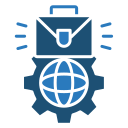Chosen theme: Essential Skills for Starting an IT Career. Welcome! This is your friendly roadmap to the core abilities that help beginners get hired, grow confidently, and enjoy the journey. Read on, share your questions, and subscribe for weekly guidance tailored to your first steps.
Computational Thinking and Algorithms
Learn to break big problems into smaller parts, define clear inputs and outputs, and reason about time and space complexity. Even simple patterns like binary search and hashing sharpen judgment and confidence early in your IT career.
Understanding the Web Stack
Grasp how browsers request resources, servers respond, and APIs exchange data using JSON. Knowing HTTP methods, status codes, and how front end, back end, and databases interact gives you practical decision power in junior roles.



Version Control and Collaboration with Git
Commit Discipline and Meaningful Messages
Commit small, logical changes with messages that describe why, not just what. Future you, your reviewers, and recruiters reading your history will appreciate clarity. This habit also makes rollbacks and bisecting dramatically easier during production incidents.
Branching, Pull Requests, and Reviews
Create topic branches, open focused pull requests, and request targeted feedback. Maya, a new graduate, landed her first role after demonstrating thoughtful reviews on open‑source issues, highlighting her curiosity, humility, and ability to collaborate asynchronously.
Resolving Conflicts and Writing Useful Docs
Treat merge conflicts as signals, not emergencies. Document setup steps, environment variables, and run commands in a concise README. Good documentation reduces onboarding friction and positions you as a reliable contributor from day one.

Asking Good Questions Without Creating Work
Explain what you tried, what you expected, and what actually happened. Include screenshots and minimal code. Alex, a junior developer, cut response time in half by linking reproduction steps and tagging the right teammate for context.
Giving and Receiving Feedback
In reviews, start with goals and user impact, then suggest concrete alternatives. When receiving feedback, restate understanding and ask clarifying questions. This turns critiques into growth, signaling maturity far beyond years of experience.
Remote Collaboration Etiquette
Communicate availability, provide daily updates, and record decisions in shared documents. Use threads to keep topics organized and avoid DM silos. Your predictability reduces friction and earns autonomy, even while you are still learning rapidly.
Continuous Learning and Career Navigation
Adopt short cycles: learn a concept, build a tiny project, share it, gather feedback, and refine. Track hours, not outcomes, to reduce pressure. Consistency beats intensity, especially while balancing study with life commitments.
Continuous Learning and Career Navigation
Join local meetups, online communities, and beginner‑friendly open‑source projects. Offer summaries of talks and share notes publicly. Reciprocity opens doors; many internships begin with a thoughtful message and a small but meaningful contribution.
Continuous Learning and Career Navigation
Normalize uncertainty by celebrating small wins and documenting progress. Compare present you to past you, not to experts. Mentors often confess the same doubts; hearing their stories reframes fear as a signal of growth.
Portfolio, Interviews, and Job Readiness
Build small, end‑to‑end apps that solve real problems: a habit tracker, expense dashboard, or API wrapper. Write a case study explaining goals, architecture, trade‑offs, and lessons learned. Recruiters want clarity more than technical theatrics.
Portfolio, Interviews, and Job Readiness
Practice aloud with friends or mock interviews. Use STAR to structure stories: situation, task, action, result. Quantify outcomes, even small ones, to demonstrate impact and learning speed. Confidence grows with repetition and honest retrospectives.
Portfolio, Interviews, and Job Readiness
Keep a one‑page resume emphasizing projects, skills, and measurable results. Mirror keywords from job descriptions. On LinkedIn, publish short insights from your learning. Apply broadly, track responses, and iterate weekly on tactics that deliver interviews.
